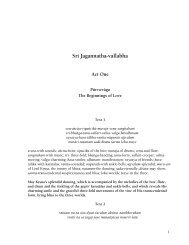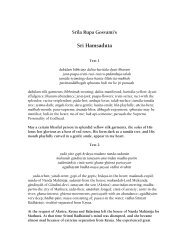Srimad Bhagavatam, Volume 3
Srimad Bhagavatam, Volume 3
Srimad Bhagavatam, Volume 3
You also want an ePaper? Increase the reach of your titles
YUMPU automatically turns print PDFs into web optimized ePapers that Google loves.
<strong>Srimad</strong> Bhagawatam, First Canto, <strong>Volume</strong> Three<br />
gain. In such discourses only the unlimited transcendental mellow is relished<br />
both by the audience and speaker and therefore they can continue the topics<br />
for many thousands of Bhagwat Saptahas held for seven days only and after<br />
finishing the show, both the audience and the speaker become engaged in<br />
material activities as usual. They can do so because neither the speaker is<br />
Bhagwat Pradhana nor the audience is Sushrusu as explained above.<br />
Sa vai mahabhagawatah parikshit<br />
Yena apvargakhyam adabhra buddhih<br />
Jnanena vaisaki sabditena<br />
Bheje khagendra dhwaja padamulam.<br />
Sa—he, Vai—certainly, Mahabhagawatah—first class devotee, Parikshit—the<br />
king, Yena—by which, Apavargakhyam—by the name of liberation,<br />
Adabhra—fixed up, Buddhi—intelligence, Jnanena—by knowledge,<br />
Vaiasaki—the son of Vyasa, Sabditena—vibrated by, Bheje—taken to,<br />
Khagendra—Gaduda the king of the birds, Dhwaja—flag, Padamulam—palm<br />
of the feet.<br />
Oh Suta Goswami you please do describe that topics of the Lord by<br />
which Maharaj Parikshit fixed up in intelligence of liberation attained<br />
the lotus feet of the Lord shelter of Goduda the king of the bird by<br />
hearing instruction vibrated by the son of Vyasa<br />
There is some controversy amongst the students on the path of liberation.<br />
Such transcendental students are known as the impersonalist and the devotee<br />
of the Lord. The devotee of the Lord worships the transcendental Form of the<br />
Lord, whereas the impersonalist meditates upon the glaring effulgence of the<br />
bodily ray of the Lord known as the Brhmajyoti. Here in this verse it is said<br />
that Maharaj Parikshit attained the lotus feet of the Lord by instructions of<br />
knowledge delivered by the son of Vyasadeva Srila Sukadeva Goswami.<br />
Sukadeva Goswami was also an impersonalist in the beginning as he has<br />
admitted himself in the Bhagwatam (SB 2.l.9); but later on he was attracted<br />
by the transcendental pastimes of the Lord and thus became a devotee. Such<br />
devotees with perfect knowledgc is called Mahabhagawata or the first elass<br />
devotee. There are three classes of devotee namely the Prakrito, Madhyam<br />
and Mahabhagawata or the 3rd, 2nd, 1st class class devotees respectively, The<br />
Prakiita or 3rd class devotees are temple worshippers without any specific<br />
knowledge of the Lord and the Lord's devotees, The Madhyam or the 2nd<br />
class devotee knows well the Lord, the Lord's devotee, the neophytes and the<br />
nondevotees also. But the Mahabhagawata or the first class devotee sees every<br />
thing in relation with the Lord and the Lord present in every one's relation.<br />
The Mahabhagwata therefore does not make any distinction particularly<br />
between a devotee and non devotee. Maharaj Pasikshit was such<br />
Mahabhagwata devotee because he was initiated by the Mahabhagawata<br />
devotee like Sukadeva Goswami. He was equally kind even to the personality<br />
of Kali and what to speak of others.<br />
So there are many instances in the transcendental histories of the world that<br />
an impersonalist has later on become a devotee; but never a devotee has<br />
become an impersonlist. This very fact proves that on the transcendental<br />
steps, the step occupied by a devotee is higher than the step occupied by the<br />
impersonlist. It is also stated in the Bhagwat Geeta (Bg. 12.5) that persons<br />
stuck up by the impersonal step undergoes more sufferings than achievement<br />
of reality. Therefore knowledge imparted by Sukadeva Goswami unto the<br />
king Maharaj Parikshit, helped him to attain the service of the Lord. And to<br />
attain to this stage of perfection is called Apavarga or the perfect stage of<br />
liberation. Simple knowledge of liberation, is material knowledge. Actually<br />
freedom from material bondage is called liberation; but to attain the<br />
transcendental service of the Lord is called the perfect stage of liberation.<br />
Such stage is attained by knowledge and renunciation as we have already<br />
explained (Bhag. l.2.12) and perfect knowledge as was delivered by Srila<br />
Sukdeva Goswami, results in the attainment of transcendental service of the<br />
Lord.<br />
Tat nah param punyam asambritartham<br />
Akhyanam ati adbhuta yoganistham<br />
Akhyahi ananta acharitam upapannam<br />
Parikhitam bhagawata abhramam.<br />
Tat—therefore, Nah—unto us, Param—Supreme, Punyam—purifying,<br />
Asambhritartham—as it is, Akhyanam—narration, Ati—very, Adbhutam—<br />
wonderful, Yoganistha—compact in Bhaktiyoga, Akhyahi—describe,<br />
Ananta—the unlimited, Acharitam—activities, Upapannam—full of,<br />
Parikshitam—spoken to Maharaj Parikshit, Bhagawata—of the pure devotees,<br />
Abhirama—particularly very dear.<br />
Therefore you may narrate before us the narrations of the unlimited as<br />
they are purifying and supreme as they were spoken to Maharaj<br />
Parikshit full of Bhaktiyoga and very dear to the pure devotees.<br />
By mentioning what was spoken to Maharaj Parikshit and which is very dear<br />
to the pure devotees means <strong>Srimad</strong> Bhagwatam. <strong>Srimad</strong> Bhagwatam is mainly<br />
full of the narrations in respect of the activities of the Supreme unlimited and<br />
therefore it is the science of Bhaktiyoga or devotional service of the Lord. As<br />
such it is para or the supreme because although it is enriched with all<br />
58<br />
knowledge and religiosity specifically it is enriched with devotional service of<br />
the Lord.<br />
Suta Uvacha<br />
Aho vayam janmabhrito adya haasma<br />
Briddhanuvrittyapi vilomajatah.<br />
Douskulyam adhim vidunoti sighram<br />
Mahattamanam abhidhana yogah.<br />
Aho—how, Vayam—we, Janmabhrito—promoted in birth, Adya—today,<br />
Ha—clearly, Asma—have become, Briddhanuvrittya—by serving those who<br />
are advanced in knowledge, Api—although, Vilomajatah—born in mixed<br />
caste, Douskulyam—disqualification of birth, Adhim—sufferings,<br />
Vidhunoti—purifies, Sighram—very soon, Mahattamanam—of those who are<br />
great, Abhidhana—conversation, Yogah—connection.<br />
Oh, God, although we are born in the mixed caste still we are distinctly<br />
promoted in our birthright simply by serving and following the great who<br />
are advanced in knowledge. Even by connection with great souls in the<br />
matter of conversation, one can cleanse up disqualification of lower birth<br />
without any delay.<br />
Suta Goswami did not take his birth in the family of Brahmin. He was born in<br />
the family of mixed caste or uncultured low family. But still on account of<br />
good and higher association like learning from Sri Sukadeva Goswami and<br />
again explaining them before the great Rishis of Naimsaranya, certainly the<br />
disqualification of his inferior birth was washed off. Lord Sri Chaitanya<br />
Mahaprabhu followed this principles in pursuance of the Vedic usages and by<br />
His transcendental association He elevated many low born or disqualified by<br />
birth or action to the status of devotional service and established them in the<br />
position of Acharyas or the authorities. He clearly defined that any man<br />
whatever he may be either a Brahmin or Sudra by birth, or a house-holder or<br />
mendicant by the order of society, if one is conversant with the science of<br />
Krashna, one can be accepted as the Acharya or Guru the spirtual master.<br />
Suta Goswami learnt the science of Krishna from great Rishis and<br />
authorities like Sukdeva, Vyasdeva etc and he was so much qualified that<br />
even the sages of Naimisaranya eagerly wanted to hear from him the science<br />
of Krishna in the form of <strong>Srimad</strong> Bhagwatam. So he had double association of<br />
great souls in the matter of hearning and preaching also. Transcendental<br />
science or the science of Krishna has to be learnt from the authorities and<br />
being conversant in the science when one preaches the science, he becomes<br />
still more qualified. So Suta Goswami had both the advahtages and as such<br />
undoubtedly he was completely freed from all disqualification of low birth<br />
disadvantages of mental agonies. This verse definitely proves it, that neither<br />
Srila Sukadeva Goswami denied to teach Suta Goswami about the<br />
transcendental science nor the sages of the Naimisaranya denied to have<br />
lessons from him on account of his inferior birth-right. This means that<br />
thousands of years before also there was not bar in the matter of learning or<br />
preaching the transcendental science on account of inferior birth. The rigidity<br />
of so called caste-system in Hindu society became prominent within one<br />
hundred years or so only when the number of Dwijabandhus or disqualified<br />
men in the the family of higher castes, increased. Lord Sri Chaitanya revived<br />
original vedic system and He elevated Thakur Haridas to the position of<br />
Namacharya or the authority in the matter of preaching the glories of the holy<br />
Name of the Lord, although His Holiness Srila Haridas Thakur was pleased to<br />
appear himself in the family of a Mahamedan.<br />
Such is the power of pure devotees of the Lord. The Ganges water is<br />
accepted to be pure and one can become purified after taking bath in the water<br />
of the Ganges; but so far the great devotees of the Lord are concerned they<br />
can purify a degraded soul even by being seen by the low born and what to<br />
speak of associating with them? Lord Sri Chaitanya Mahaprbhu wanted to<br />
purify the whole atmosphere of the poluted world by sending qualified<br />
preachers all over the world and it remains with the Indians only to take up<br />
the task scientifically and thus to do the best kind of humanitarian work of<br />
preaehing the holy Name of the Lord by qualified men than to immitate some<br />
sterio-typed immitation philonthrophic work like opening of hospitals etc. The<br />
mental disease of the present generation is more acute than bodily diseases; it<br />
is quite fitness of things and proper to take up the work of preaching <strong>Srimad</strong><br />
Bhagwatam all oven the world by proper personalities and without any delay.<br />
Mahattamanam Abhidhana means also dictionary of great devotees or a book<br />
full of the words of great devotees. Such dictionary of the words of great<br />
devotees and that of the Lord in the Veda and allied literatures specifically the<br />
<strong>Srimad</strong> Bhagwatam."<br />
Kutah punar grinatah nama tasya<br />
Mahattama ekanta parayansya.<br />
Yo ananta shaktirbhagwan ananto<br />
Mahad gunatwat yam anantam ahu.<br />
Kutah—what to say, Punar—again, Grinatah—one who chants, Nama—holy<br />
Name, Tasya—his, Mahattama—great devotees, Ekanta—exclusive,<br />
Parayanasya—of one who is shelter of, Yo—He who, Ananta—is the<br />
unlimited, Shakti—potency, Bhagawan—the Personality of Godhead,












